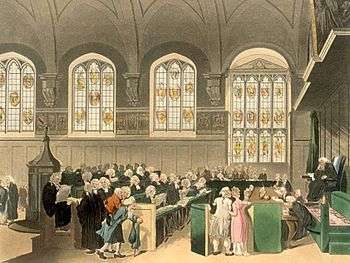Equitable conversion
| Property law |
|---|
| Part of the common law series |
| Types |
| Acquisition |
| Estates in land |
| Conveyancing |
| Future use control |
| Nonpossessory interest |
| Related topics |
| Other common law areas |
| Equitable doctrines |
|---|
 |
| Doctrines |
| Defences |
| Equitable remedies |
| Related |
Equitable conversion is a doctrine of the law of real property under which a purchaser of real property becomes the equitable owner of title to the property at the time he/she signs a contract binding him/her to purchase the land at a later date. The seller retains legal title of the property prior to the date of conveyance, but this land interest is considered personal property (a right to the payment of money, rather than a right to the property[1]). The risk of loss is then transferred to the buyer – if a house on the property burns down after the contract has been signed, but before the deed is conveyed, the buyer will nevertheless have to pay the agreed-upon purchase price for the land. Such issues can and should be avoided by parties by stipulating in the contract who will bear the loss in such occurrences. The above rule varies by jurisdiction, but is the general rule.
Effect of death of a party
If one of the parties dies after the contract for sale of the property has been executed, the doctrine will govern how that party's interest will pass to his heirs. For example, the seller wills his real property to his son, and his personal property to his daughter. If the seller dies after a contract for conveyance is signed by a buyer, the seller's interest in the land will be treated as personal property, and the proceeds of the sale will pass to his daughter. In most jurisdictions, the real property interest created by the contract will pass to the buyer's heirs, while the seller's personal property interest created by the contract will pass to the seller's estate.
The State of New York does not recognize equitable conversion. In New York, as long as the buyer is without fault, the risk of loss remains on the seller until the buyer takes title or possession.
Uniform Vendor and Purchaser Risk Act
A growing minority of States have adopted the Uniform Vendor and Purchaser Risk Act (UVPRA) in one form or another.[2] The UVPRA negates the doctrine of Equitable Conversion as it relates to the risk associated with loss. The risk of loss is retained by the seller (Vendor/Grantor) under the UVPRA.[3] Generally, the provisions of the UVPRA can be modified or avoided in the Land Sale Contract.
References
- ↑ "Conveyancing Adelaide". E Conveyancing Adelaide. Retrieved July 18, 2014.
- ↑ Rabin, Edward et al. Fundamentals of Property Law. Foundation Press: New York, 2006. pp. 1128–1129.
- ↑ N.Y. Gen. Oblig. Law § 5-1311 (McKinney) New York Statutes. "When either the legal title or the possession of the subject matter of the contract has been transferred to the purchaser, if all or any part thereof is destroyed without fault of the vendor or is taken by eminent domain, the purchaser is not thereby relieved from a duty to pay the price, nor is he thereby entitled to recover any portion thereof that he has paid; but nothing herein contained shall be deemed to deprive the purchaser of any right to recover damages against the vendor for any breach of contract by the vendor prior to the destruction or taking."